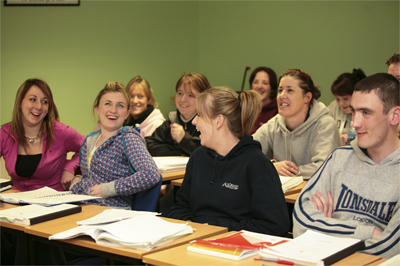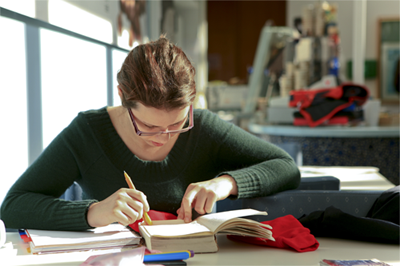-
Courses

Courses
Choosing a course is one of the most important decisions you'll ever make! View our courses and see what our students and lecturers have to say about the courses you are interested in at the links below.
-
University Life

University Life
Each year more than 4,000 choose University of Galway as their University of choice. Find out what life at University of Galway is all about here.
-
About University of Galway

About University of Galway
Since 1845, University of Galway has been sharing the highest quality teaching and research with Ireland and the world. Find out what makes our University so special – from our distinguished history to the latest news and campus developments.
-
Colleges & Schools

Colleges & Schools
University of Galway has earned international recognition as a research-led university with a commitment to top quality teaching across a range of key areas of expertise.
-
Research & Innovation

Research & Innovation
University of Galway’s vibrant research community take on some of the most pressing challenges of our times.
-
Business & Industry

Guiding Breakthrough Research at University of Galway
We explore and facilitate commercial opportunities for the research community at University of Galway, as well as facilitating industry partnership.
-
Alumni & Friends

Alumni & Friends
There are 128,000 University of Galway alumni worldwide. Stay connected to your alumni community! Join our social networks and update your details online.
-
Community Engagement

Community Engagement
At University of Galway, we believe that the best learning takes place when you apply what you learn in a real world context. That's why many of our courses include work placements or community projects.
School of Psychology
School of Psychology
Welcome. The School of Psychology is housed in a purpose-built facility in the centre of campus. We are dynamic, innovative and recognised for our teaching, research, and community contribution. We have a suite of professionally accredited undergraduate and postgraduate (Higher Diploma, Masters and PhD) programmes. We also have two active and successful research streams: Brain & Behaviour, and Health & Wellbeing. Researchers from both have participated in acquiring major national and international funding awards and we continue to develop a strong profile in quantity and quality of research output.
Latest University News
12 December 2025
Researchers unlock secrets of spinal disc degeneration
New research into the arrangement of sugar chains or ‘glycans’ in the cells of the spine has shed light for the first time on the critical role it plays in the complex process of disc degeneration.
Researchers at CÚRAM - Research Ireland Centre for Medical Devices at University of Galway, together with a team of international colleagues, carried out a comprehensive investigation into the different characteristics of glycans in healthy and degenerated intervertebral discs.
It is the first time that the whole human disc glycome in the spine - the entire set of sugar chains that modify human proteins and lipids - have been analysed in this way.
Intervertebral disc (IVD) degeneration is a major cause of low back pain, a significant global health issue. While glycosylation is critical for cellular signalling and inflammation, its malfunction can lead to diseases and its role in IVD degeneration has remained poorly understood until the research was conducted.
Dr Kieran Joyce, first author of the paper, said: “From this research, we now know which sugars are expressed in the degenerated or diseased disc states, so we can design therapies to target this.
“We observed distinct alterations in glycan expression, notably an overabundance of sialic acid on the surface of the cells in degenerated discs and decreased branching, which are associated with IVD degeneration. These observed differences have implications for regulating inflammatory responses and other cellular activities.”
Professor Abhay Pandit, Scientific Director of CÚRAM and senior author of the research paper, said: “Our findings suggest that there is therapeutic potential in using biomaterial systems to intervene and alter the way proteins and glycans attach to each other to reduce inflammation associated with IVD degeneration. This research significantly advances our knowledge of the glycomic mechanisms underlying IVD degeneration and opens new avenues for developing therapies to restore disc physiology.”
The finding of the research have been published in Advanced Science and can be accessed at https://advanced.onlinelibrary.wiley.com/doi/10.1002/advs.202506669?af=R.
The project was carried out by CÚRAM researchers at University of Galway in collaboration with colleagues at Maynooth University, University College Dublin, the National Institute for Bioprocessing Research and Training (NIBRT), the Medical University of South Carolina and the Institute of Chemical Technologies and Analytics in Austria.
Ends
10 December 2025
University’s Institute for Clinical Trials wins 2025 Collaboration in Medtech Award
University of Galway’s Institute for Clinical Trials has been awarded the 2025 Collaboration in Medtech Award at the Irish Medtech Awards.
The accolade recognises the Institute’s outstanding leadership in advancing early-stage medtech innovation through high-impact clinical partnerships, including the establishment of the Hypercare initiative to supports partners in the clinical trials approval process.
It is the second year in a row in which University of Galway has won the Collaboration in Medtech Award.
Established in 2023, the Institute for Clinical Trials is focused on transformation of the clinical research landscape in Ireland by creating an environment where scientific advances are translated into improved care for patients.
The 2025 Collaboration in Medtech Award was secured for the Institute’s Hypercare initiative, which has been developed to transform how early-stage medtech trials are delivered in Ireland. The initiative is a national pilot, designed to support industry collaborators in navigating complex approval processes for a clinical trial, from ethics and regulatory submission to system requirements of the Health Service Executive, through to initial patient enrolment.
Aligned with the mission of the Institute for Clinical Trials, this project drives excellence, inclusivity, and need-driven research to improve global health outcomes. Clinical trials increase the opportunities of patients to have early access to innovative treatments that could improve, extend or even save their lives. Encouraging more research must be a priority for those bodies charged with improving the nation’s health and the Hypercare initiative seeks to support this by ensuring Ireland is a location of choice for early feasibility/phase MedTech trial conduct and delivery. The Hypercare project aims to highlight positive changes in the delivery of clinical research in Ireland, attracting further interest and investment from MedTech stakeholders nationally and internationally.
Professor Fidelma Dunne, Director of the Institute for Clinical Trials at University of Galway, said: "It is a real honour for the Institute to win the 2025 Collaboration in Medtech Award. Collaboration is at the heart of everything we do at the Institute for Clinical Trials, and this recognition reflects the commitment of our team and our partners.
“The Hypercare initiative stands out as the model for academic–industry collaboration, advancing innovation while upholding the highest clinical and regulatory standards. By working closely with innovators, from early-stage start-ups to global leaders, we are making great strides in demonstrating where Ireland can lead in the world of clinical trials as well as accelerating the delivery of new technologies that can truly improve patient outcomes at home and across the globe."
Hypercare has successfully supported four companies to date through the pilot, two of which have launched a first-in-human use of their device in Ireland – Medtronic and Intervene.
By bringing together clinical expertise, regulatory guidance, and real-world testing, the Institute helps partners move through approvals in a more structured and predictable process and therefore more quickly through early clinical validation with the hope of bringing new helathcare solutions to patients in Ireland and beyond.
The Collaboration in Medtech Award celebrates the Institute’s success in forging partnerships that strengthen Ireland’s position in medtech and support a more collaborative, efficient, and innovative approach to clinical research.
Irish Medtech, the Ibec group that represents the medtech sector, Enterprise Ireland and IDA Ireland held the awards as part of Medtech Rising, an annual conference for the sector held this year at The Galmont Hotel in Galway.
Ends
8 December 2025
Na chéad trialacha ar domhan do leigheas nua ar phian ainsealach á gcur i gcrích in Éirinn
Fuair Cuibhreannas CrannMed Ltd., Salaso Health Solutions Ltd., Ollscoil na Gaillimhe agus Coláiste Ríoga na Máinleá in Éirinn maoiniú €6.5m tríd an gCiste Nuálaíochta Teicneolaíochtaí Suaiteacha
Tá cuibhreannas de chomhlachtaí teicneolaíochta leighis, cúraim sláinte digití agus taighdeoirí ollscoile ag seoladh sraith trialacha cliniciúla den chéad uair ar domhan, dírithe ar fhaoiseamh fadtéarmach a thabhairt do dhaoine atá ag fulaingt le pian ainsealach mhatánchnámharlaigh.
Bronnadh infheistíocht rialtais €6.5 milliún ar an gcomhpháirtíocht idir CrannMed, Salaso Health Solutions, an Institiúid do Thrialacha Cliniciúla in Ollscoil na Gaillimhe agus Coláiste Ríoga na Máinleá in Éirinn.
Tá an maoiniú, arna fhógairt ag an Aire Fiontar, Trádála agus Fostaíochta, Peter Burke T.D., mar chuid den tráinse is déanaí de dhámhachtainí ó Chiste Nuálaíochta Teicneolaíochtaí Suaiteacha.
Tá an tsraith trialacha cliniciúla á comhordú ag an Institiúid do Thrialacha Cliniciúla in Ollscoil na Gaillimhe agus ag Coláiste Ríoga na Máinleá in Éirinn.
Comhcheanglaíonn clár na dtrialacha dhá theicneolaíocht chomhlántacha chun torthaí a fheabhsú do dhaoine atá ag fulaingt le pian ainsealach mhatánchnámharlaigh. Beidh deis ag othair teacht ar chóireáil cheannródaíoch do phian atá forbartha ag CrannMed agus ar chlár téarnaimh atá forbartha ag Salaso le tacaíocht ó speisialtóirí cliniciúla.
Sa chéad triail, gheobhaidh othar instealladh a choisceann sreabhadh fola chuig suíomh na péine, rud a laghdóidh athlasadh agus néarchinn fhánacha, atá mar phríomhchúis leis an bpian.
Tar éis na cóireála tosaigh, déanfaidh an dara triail measúnú ar théarnamh an othair agus tacaíocht á fáil acu ó sheirbhís dhigiteach féinbhainistíochta bunaithe ar an Intleacht Shaorga. Bíonn ar othair, a bhfuil pian ainsealach orthu, tabhairt faoi phróiseas téarnaimh struchtúrtha le neart a fhorbairt agus le hathléimneacht fíochán matánchnámharlaigh a fheabhsú.
Ina theannta sin, cuirfidh na trialacha ar chumas eolaithe agus taighdeoirí sna hionaid chliniciúla teicnící nua íomháithe, dearaí trialacha cliste agus modheolaíochtaí tomhais
péine a fhorbairt a bheidh de dhíth chun an réiteach seo a dhéanamh caighdeánach laistigh de chórais cúraim sláinte.
Dúirt Liam Farrissey, Príomhfheidhmeannach CrannMed: “Is mór an sásamh dúinn a bheith in ann cuibhreannas ar chaighdeán chomh hard a chur le chéile anseo in Éirinn. Cuimsítear leis an gcuibhreannas réimse leathan scileanna – taighde agus forbairt na gcoincheap, déantúsaíocht, bailíochtú cliniciúil agus tacaíocht na hintleachta saorga d’fhéinbhainistíocht othar; agus tá an saineolas ar fad ag teacht ó fhoirne den scoth atá ag feidhmiú sa tír. Buntáiste iontach amháin a bhaineann leis seo is ea go mbeimid in ann ár gcóireáil a chur ar fáil d’othair Éireannacha i bhfad níos luaithe ná mar ab fhéidir murach sin. Má éiríonn linn, d’fhéadfadh sé bealach nua a leagan amach chun cóireáil a chur ar othair a bhfuil pian ainsealach orthu.”
Dúirt Aoife Ní Mhuirí, Salaso: “Tríd an intleacht shaorga a úsáid chun rannpháirtíocht a mhéadú le cláir féinbhainistíochta atá leagtha amach go cliniciúil, beidh torthaí níos fearr ag othair agus laghdófar an méid ama a bheidh ar dhochtúirí nó ar theiripeoirí maoirseacht a dhéanamh ar chúram iarghnáthaimh. Is féidir an cóireáil agus an téarnamh a dhéanamh níos gaire do bhaile, rud a shábhálann am agus airgead ar othair agus ar an gcóras sláinte. Tá an cur chuige níos inbhuanaithe, níos inrochtana d’othair, agus tá an cumas aige caighdeán domhanda nua a leagan amach maidir le bainistíocht péine.”
Dúirt an tOllamh Fidelma Dunne, Stiúrthóir na hInstitiúide do Thrialacha Cliniciúla in Ollscoil na Gaillimhe: “Tá sé i gceist ag an tionscadal seo réabhlóid a dhéanamh ar an gcaoi a gcuirtear cóireáil ar phian ainsealach sna hailt agus sna matáin. Cuirfidh an chóireáil nuálach agus an triail chliniciúil ar chumas othar faoiseamh éifeachtach, fadtéarmach a fháil ó phian ainsealach agus ní bheidh gá le máinliacht ná le drugaí andúile. Is sampla den chomhoibriú is fearr idir an earnáil acadúil agus tionsclaíochta é an tionscadal seo agus tá ríméad ar an Institiúid do Thrialacha Cliniciúla tacú leis na comhpháirtíochtaí seo trí shaineolas trialach cliniciúil a chur ar fáil.”
Dúirt an tOllamh Fergal O’Brien, Leas-Seansailéir Taighde agus Nuálaíochta in RCSI: “Tá bród ar RCSI tacú le teicneolaíocht leighis nuálach Éireannach leis na chéad trialacha cliniciúla ar dhaoine anseo in Éirinn. Léiríonn an chomhpháirtíocht seo go bhfáiltítear anseo in Éirinn roimh chomhoibriú i réimse an taighde chliniciúil, agus tá RCSI tiomanta do bheith ag obair le comhlachtaí Éireannacha chun réitigh shláinte nua a sholáthar d’othair.”
Dúirt an cuibhreannas go bhfuiltear ag súil go mbeidh na buntáistí a eascraíonn as an gcóireáil agus as na teicneolaíochtaí atá á dtriail deich n-uaire ar a laghad níos fearr ná instealltaí stéaróideacha, atá mar chaighdeán reatha cúraim i gcásanna péine ainsealaí matánchnámharlaigh.
Rinneadh an infheistíocht €6.5m faoi Ghairm 7 den Chiste Nuálaíochtaí Teicneolaíochtaí Suaiteacha (DTIF).
Críoch

























